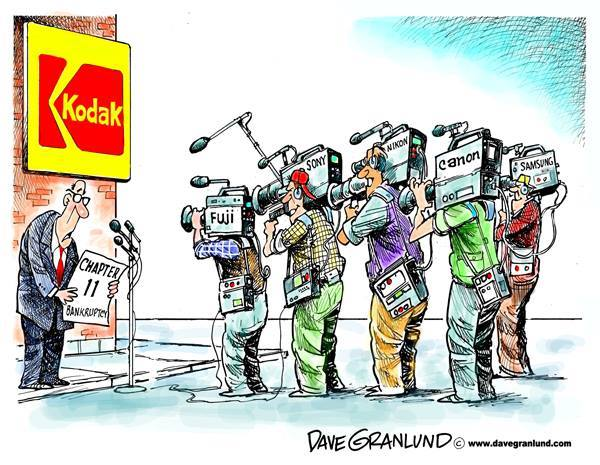THE GREATEST FAILURES

I collect failure stories. Some other time, I’ll share some of my own failure stories. Here are my top 3 failures from the business world.
I like books that detail failures much more than books that detail success. “Losing the Signal” is way more educational than “7 Habits of Successful People”.
KODAK was the king of photography. By and large, Kodak invented photography as we knew it in the 20th century. They perfected the technology and by the 1990s a Kodak kiosk was pretty much on every corner of every city around the world. Then, in the late 1990s, digital photography started becoming a thing, and Kodak completely ignored it. Some would say that’s the fate of all “old” players, but Nikon and Canon embraced digital and emerged as top players again, while Kodak kept dismissing the new technology until in 2012 it filed for bankruptcy. Even though the company is still around, kids younger than 18 probably won’t even recognize this name.
More the Kodak failure in “Out of Focus: The story of how Kodak lost its direction” by J. Larish.
NOKIA was the king of mobile telephony. A truly global player. Almost a monopoly in some countries. Flush with money and sitting on thousands of patents pertaining to mobile phones. In 2000 it accounted for 4% of the GPD of Finland. Then along came the smartphones. First, the BlackBerry and then iPhone changed how we use our phones, and Nokia completely missed the wave of mobile email, touchscreens and app stores. By late 2000s it was trying to catch up, but it was too late. Embarrassingly, they did have a big early warning in the form of BlackBerry, and they missed it. Then, of course, when iPhone came out, it was way too late.
Notably, BlackBerry’s story is almost identical to that of Nokia in the post-iPhone era. Again, ask kids younger than 18, and they won’t know what Nokia is.
More on the BlackBerry and Nokia failure in “Losing the Signal: The Untold Story Behind the Extraordinary Rise and Spectacular Fall of BlackBerry” by J. McNish and S. Silcoff.
Yahoo! was probably the first true Silicon Valley success story, the biggest story of the late 1990s. They ruled the Internet search industry. Destroyed by two dudes with an algorithm. At least Kodak and Nokia lost to other big rivals. Yahoo! lost to literally two kids. Looking back, it’s hard to comprehend how did Yahoo! not see it coming, why they never bought Google while they could, and why they could never develop a better algorithm and clean up their ad-cluttered website.
More on the Yahoo! failure in “Marissa Mayer and the Fight to Save Yahoo!” by N. Carls
Honorable mentions:
. Blockbuster
. The Encyclopedia Britannica
. MySpace
LESSON?
Most people would say, the lesson is that big and “old” companies are often so comfortable in their dominant position that they fail to spot new opportunities and adapt.
For me though the LESSON is that it is really, REALLY hard to identify truly promising new opportunities. Even the biggest industry experts have a hard time telling which trends are junk and which ones are gold.
Looking back, we all know Kodak should have gone digital and Yahoo! should have bought Google. But the truth is, thousands of new things are presented every day. It’s nearly impossible to identify true gems in this noise at the time they are presented.
Try it yourself.
Should BMW invest billions in going electric? Or should they continue investing in hydrogen? Or self-driving? Or just keep building top-quality gasoline cars?
Should power companies bet everything on solar? Or wind? Or new-generation nuclear? Or should they continue investing in cleaner fossil fuels?
Should Amazon spend billions on drone delivery? Or should it pump billions in Blue Origin (space exploration) or is it just a toy?
How about Musk’s Boring company? Or Hyperloop?
Should Apple spend billions on trying to build its own “Google Glass”? Or an electric self-driving car? Or could the money be spent better elsewhere?
We will know for sure in 30 years, but the truth is, today nobody knows for sure. Google, Facebook, Apple buy hundreds of startups, and 99% of them turn out to be a waste of money. It’s easy to judge the bad decisions of the past. It’s really, REALLY hard to predict the future.
My favorite book on this is “Everything Is Obvious. Once You Know the Answer” by D. Watts
